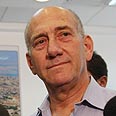
Olmert in court: I’ll come out innocent
For first time in State's history, a former prime minister faces long list of accusations in corruption affairs. Upon entering courtroom he says, 'It's time for the facts. I came here an innocent man and this is how I'll leave.' Court decides to begin hearing testimonies in February 2010; discussions to be held three times a week
Former Prime Minister Ehud Olmert's trial opened Friday morning, a year and four days after he submitted his resignation to the president. This is the first time in the State of Israel's history that a former prime minister is put on trial for serious offenses allegedly committed during his public mission.
At the end of Friday's session, which lasted about an hour, the Jerusalem District Court decided to begin hearing the testimonies on February 22, 2010. Olmert's lawyers had asked to delay the testimony stage to April. Discussions will be held three times a week – on Monday, Tuesday and Thursday.
Upon his arrival at the courtroom, Olmert turned to the media and made a short statement: "This is certainly not an easy scene for me. For the past three years I have been subject to an almost inhumane system of smearing and investigations, and have naturally paid a heavy price for this period of time.
"Now is the time for facts, and only facts. I have come here as an innocent man, and I believe I'll come out of here an innocent man," the former prime minister said.
He refused to answer any questions. Olmert's former bureau chief, Shula Zaken, also arrived at court but refused to talk to the media.
Jerusalem District Prosecutor Eli Abarbanel arrived at the court shortly afterwards. "This case has finally reached the court after a year and a half," he told the media. "This is the suitable place for the facts and legal claims to be examined. This is the place to run a discussion which will be through and to the point.
Abarbanel said that State Prosecutor Moshe Lador, who was involved in the early procedures of the case, was absent due to "personal reasons."

Olmert addresses reporters (Photo: Gil Yohanan)
The panel of judges is comprised of Justices Moussia Arad, Jacob Zaban and Moshe Sobel.
After the judges entered the courtroom, the defendants Olmert and Zaken sat side by side. Olmert's lawyer, Eli Zohar, told the panel, "We have read the indictment and cannot respond to it at the moment."
Justice Arad turned to the defendants and asked, "Have you read the indictment and understood it?" The two gave a positive response. The discussion was said to be relaxed, although the former prime minister appeared tense.
The serious and unprecedented indictment filed against the former prime minister includes charges of fraud, breach of trust, falsifying corporate records and tax evasion, as well as a charge of fraudulently obtaining benefits to which the State attributes aggravated circumstances.
Olmert's former bureau chief is accused of the same offenses, excluding tax evasion, and has also been charged with illegal wiretapping.
The indictment spans three of the scandals the former prime minister was entangled in: The Talansky case, the Rishontours double billing case and the Investment Center case. The indictment does not include bribery charges, despite police recommendations in the matter.
Long trial ahead
Attorney Eli Zohar explained upon arriving at the court that the defense team would not response to the indictment after it is read. "We will not respond to the charges because we have to see all the material, receive all the material and go through a number of technical stages before responding to the indictment.
Zohar said it would be "a bit pretentious" to say that the former prime minister's trial would end with a plea bargain.
Attorney Navot Tel-Tzur, a member of Olmert's defense team, said upon entering the courtroom, "There is no doubt this will be a long and complicated trial." He expressed his confidence that Olmert would come out clean and with a clean conscience.
Olmert arrived at court after returning to Israel from abroad, where he was on private business. On the eve of the trial, he gave an interview to the BBC and said he was confident of his innocence.
"I have nothing to prove. Someone else must prove that I made a mistake, and I don’t think they'll be able to do that," he said in the interview.










